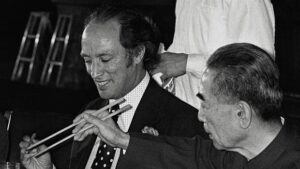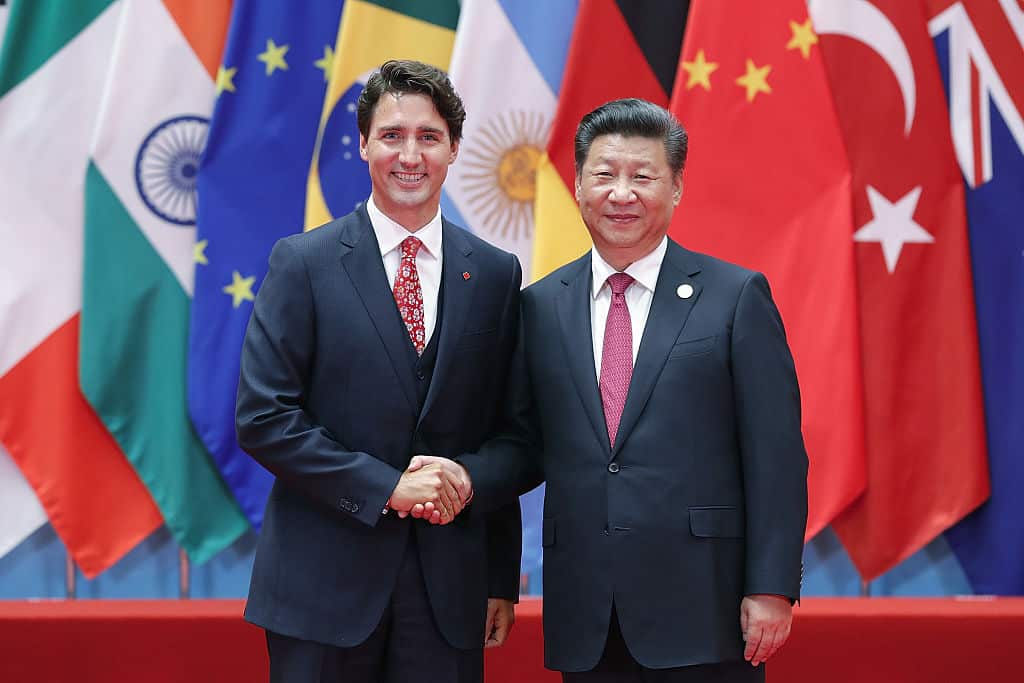Anyone surprised by Canadian Prime Minister Justin Trudeau’s expressed “admiration” for the Chinese communist dictatorship has not been paying attention. Justin Trudeau has been an apologist for the Chinese regime for years. In a very real sense, it was bred into him.
In the wake of his heavy-handed response to the Canadian Freedom Convoy of truckers who are in Ottawa protesting his vaccine mandates, Trudeau’s hardline policies suggest he has moved from mere “admiration” to outright emulation of Chinese methods. Authorizing Canadian banks to freeze the assets of any account holder the bank may believe has provided funds or support to the protestors suggests the kind of “social credit” system Beijing imposes on its own subjects.
This is nothing new. For the Trudeaus of Canada, it’s a family tradition. In my recent book, Red Handed, I devoted a full chapter to two political dynasties on opposite side of Niagara Falls – the Bush family and the Trudeau family of Canada.
No one paid much attention to Justin Trudeau’s quote during a Liberal Party fundraiser in 2013: “There’s a level of admiration I actually have for China. Because their basic dictatorship is allowing them to actually turn their economy around on a dime and saying, ‘We need to go greenest fastest, we need to start, you know, investing in solar.’”
But a deeper look at the Trudeau family and its 73-year-old ties to Communist China shows both ideological and financial connections between them.
His father, Pierre Trudeau, was the third-longest-serving prime minister of Canada, in office from the late 1960s until 1984, with a brief interruption in 1979. The young Pierre first visited China in 1949, while the country was still engulfed in revolutionary violence between Mao Zedong’s People’s Liberation Army and the nationalist forces under Chiang Kai-shek. Pierre Trudeau was deeply influenced by the ideology of socialism, writing a book about his travels that gushed, “The party of the people – socialism, communism – will eventually come out the winner.”
Eleven years later, and still a nobody, Pierre returned to China in 1960, at the invitation
Decades later, on the eve of son Justin’s rise in national politics, a Chinese government-controlled printing house published a new Chinese translation of Pierre Trudeau’s 1968 book. It launched with a lavish press conference in Shanghai. Justin’s younger brother Alexandre attended, flanked by the now-elderly Jacques Hébert, who called it a “miracle.” What the Chinese government paid the Trudeaus for the rights to the book has never been disclosed. Perhaps it was simply an opportunity to put some money in the pocket of a powerful political family in Canada and cultivate the relationship further?
If so, it wouldn’t be the first time. That would more likely be in 1978, when a Canadian company called The Power Corporation formed the Canada-China Business Council (CCBC). Canadian journalist Jonathan Manthorpe would describe the CCBC as the Chinese Communist Party’s principal channel for influence in Canada. The Power Company was started by fellow Quebecker Paul DesMarais, a political funder and longtime supporter of Trudeau. After he retired from politics in 1984, Pierre Trudeau went to work for the Power Corporation, further nurturing those deals and becoming wealthy from consulting fees paid by Canadian companies looking to access the Chinese market. The legacy of these arrangements would provide the base of support for his son, Justin, when he ran for prime minister decades later.
Pierre Trudeau also joined a Montreal law firm whose practice also helped Canadian companies access the burgeoning China market. He led delegations of Canadian businessmen to China in the mid-1980s, introducing them to the highest levels of the Beijing government including Premier Deng Xiaoping. He was preparing to lead another such junket in 1989, with his two sons, when the Tiananmen Square massacre ruined his plans. That trip was delayed for a year, with son Alexandre later describing how his father had to dance around “the sad difficulties that China had recently faced.”
Pierre Trudeau’s associations with, admiration of, and work for China caught the attention of Canada’s intelligence services. Yet, we will never know the full extent of the Trudeau family’s commercial and other ties with Beijing because in 2019 it was revealed that Canada’s top spy agency had destroyed all its files on Pierre Trudeau thirty years earlier, in a decision that historians denounced as a “crime against Canadian history.”
Beijing was certainly excited about Justin Trudeau’s 2015 election as prime minister, retitling a 2016 Chinese language publication of Justin’s memoirs as “The Legend Continues.” In May 2016, Justin Trudeau attended an intimate $1,500-a-head fundraiser at a beautiful Toronto mansion owned by Benson Wong, now the chairman of the Chinese Business Chamber of Commerce. One of the attendees was Zhang Bin, an advisor to the Beijing government who was also head of something called the China Cultural Industry Association, which the government controlled. Among the other billionaires in attendance was Wei Wei a wealthy real estate developer who had previous discussions with Trudeau about ties between Canada and China. In 2020, Wei police raided Wei’s 20,000 square-foot home near Toronto for running an illegal gambling operation and for allegations of human trafficking of women, too. “The money moving through these underground casinos leads to huge profits for criminals that fund other ventures such as prostitution and drug trafficking,” said the York Regional Police in a statement.
Zhang Bin made a $200,000 contribution shortly after the fundraiser to the Trudeau Foundation, established with Canadian taxpayer money to promote the legacy of Justin’s father.
In March 2017, Justin Trudeau’s government reversed a previous decision recommended by the Canadian Security Intelligence Service to bar a Chinese company called O-Net from taking over a Canadian research firm whose work related to technology applicable to laser-directed energy weapons. Later, it permitted another Chinese firm, Hytera, to purchase Norst International, a Canadian company that provides military satellite communications systems to the US Department of Defense and the government of China’s enemy, Taiwan. Trudeau’s government allowed the purchase without even doing an in-depth security review,” according to the book Insidious Power.
As prime minister, Justin Trudeau joined forces with Beijing to take a stake in China’s “Asian Infrastructure Investment Bank, which was seen as China’s competitor to the World Bank. Canadian diplomats warned him that the bank would become leverage for China to gain regional influence and export its model of governance around the world. Trudeau ignored their warnings.
During the COVID-19 pandemic, Trudeau’s administration gave lucrative contracts to a Chinese company to produce personal protective equipment, even as Canadian companies offered the same capacity.
When Justin Trudeau leaves office, he will doubtless be looking for financial opportunities just as his father and brother, and so many other politicians, have done. Will he mimic his father and build his own network of government contacts in China? Trudeau family tradition certainly suggests it. And we must also ask, will he conduct the balance of his tenure in office with that longer term goal in mind?

